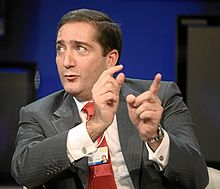Protests in Jordan from 2011

The protests in Jordan from 2011 onwards began on January 7, 2011.
The Islamic Action Front called for protests against the 26 January 2011 Jordanian government of Samir Rifai on. King Abdullah II bin al-Hussein called for real reforms in January 2011 due to the developments in Tunisia and Egypt . Prime Minister Samir Rifai was deposed and on February 1, 2011 Maʿruf al-Bachit was entrusted with forming a government, who had already held the office of Prime Minister from 2005 to 2007.
Even after reforms were announced, many people continued to demonstrate. 130 people were injured and one man was killed. Three men died after being set on fire for various reasons during the protests.
In response to the protests, an electoral law was passed and an independent electoral commission was created. The right to vote should be improved again until the election in January 2013.

With the exception of minor protests in April 2012, the situation had initially stabilized, but the largest protests since the beginning of 2011 took place in November 2012 after a cut in subsidies for petrol, diesel and gas for cooking.
On January 23, 2013, the general election was held, which the Muslim Brotherhood , the strongest opposition force, boycotted. Previously, the royal family changed the right to vote by introducing the option of a second vote. The king also amended the constitution, stating that the election of the head of government and the cabinet should be made by parliament; however, "in coordination" with himself. The monarch's right to dissolve parliament and recall the government was not affected.
After the election, which ended with a victory for the loyalists, protests in Maʿan and Mafrak, some of which were violent, broke out .
Web links
Individual evidence
- ^ Protests in Jordan - Down with the government! Long live the king! , spiegel.de, accessed on March 30, 2011
- ↑ Jordanian king orders political reforms from February 2nd, 2011 on welt.de after unrest
- ↑ https://www.abc.net.au/news/2011-03-26/man-dies-130-injured-in-jordan-clashes/2641714?pfm=ms
- ↑ http://www.gmanetwork.com/news/story/244289/news/world/second-jordanian-dies-after-setting-himself-on-fire
- ↑ Daoud Kuttab, Helga Klinger-Groier: Jordan. Spring - a season that keeps coming back. In: Welt online. July 11, 2012, Retrieved July 16, 2012 .
- ↑ Jordan. Domestic politics. Federal Foreign Office, November 2012, accessed December 9, 2012 .
- ^ Large dossier on Jordan. In: Focus online. Retrieved July 16, 2012 .
- ^ A b Ann-Kathrin Seidel: The clientele policy remains. In: TAZ. January 23, 2013. Retrieved January 25, 2013 .
- ^ A b Riots in Jordan. In: TAZ. January 24, 2013. Retrieved January 25, 2013 .
